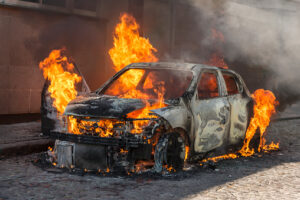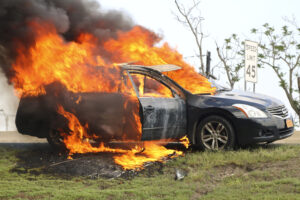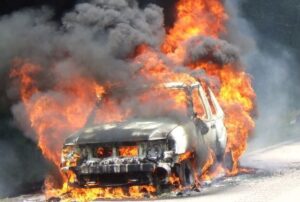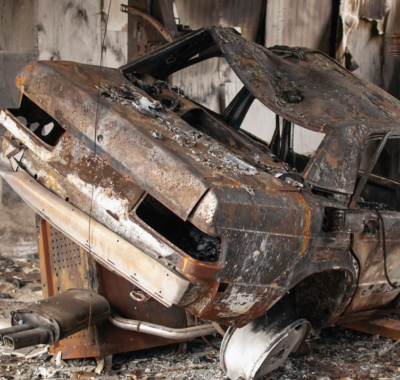Car fires can be a terrifying and dangerous situation, but they are unfortunately all too common. Whether caused by a mechanical malfunction or human error, car fires can put lives at risk and cause significant damage to property.
There are many potential causes of car fires, including mechanical malfunctions, electrical issues, and human error. Therefore, it is important to be aware of the potential causes of car fires and to know what to do if you find yourself in this situation.
By being prepared and knowing what to do, you can help prevent car fires and protect yourself and others in the event of an emergency.
What causes a car to catch fire?

There are several possible causes of a car catching fire, such as a faulty fuel system, an electrical issue, or a problem with the vehicle’s exhaust system. In some cases, a car fire can be caused by a collision or other accident that damages the vehicle and exposes its fuel or electrical systems to sparks or other sources of ignition.
It’s also possible for a car to catch fire if flammable materials are stored inside the vehicle and are exposed to heat or sparks. In any case, it’s important to identify the cause of the fire so that it can be addressed and prevented from happening again in the future.
Overview of the causes of car fire:
Faulty fuel system: A car’s fuel system can catch fire if it has a leak or other malfunction that allows fuel to come into contact with heat or sparks.
Electrical issues: An electrical problem in a car, such as a short circuit or malfunctioning wiring, can generate heat or sparks that ignite flammable materials and cause a fire.
Exhaust system problems: The exhaust system in a car is responsible for directing hot gases away from the engine and out of the vehicle. If there is a problem with the exhaust system, such as a leak or blockage, it can cause heat to build up inside the vehicle, potentially leading to a fire.
Accidents or collisions: A car fire can be caused by an accident or collision that damages the vehicle and exposes its fuel or electrical systems to sparks or other sources of ignition.
Flammable materials: If flammable materials, such as gasoline, oil, or cleaning products, are stored inside a car and are exposed to heat or sparks, they can ignite and cause a fire.
How should you put out a car engine fire?
If a car engine catches fire, it’s important to take immediate action to try to extinguish the flames before they can spread and cause more damage.
Here are some steps to follow if you need to put out a car engine fire:
1. If you are driving the car when the fire starts, safely pull over to the side of the road and turn off the engine.
2. If the fire is small and contained in a specific area, such as an engine compartment, try to extinguish it using a fire extinguisher. Aim the nozzle of the extinguisher at the base of the flames and use a sweeping motion to cover the entire area.
3. If the fire is too large to be extinguished with a fire extinguisher, or if you do not have a fire extinguisher readily available, call 911 to request assistance from the fire department.
4. In the meantime, stay a safe distance away from the car and do not attempt to open the hood or move the car.
5. If you are unable to safely put out the fire, your best option is to evacuate the area and wait for the fire department to arrive.
Remember that car fires can be extremely dangerous and can spread quickly. If you are not confident in your ability to put out the fire safely, it’s always better to call for help and let trained professionals handle it.
Importance of car fire extinguisher

A car fire extinguisher is an important safety device that can help you quickly and effectively put out a fire in your car. In the event of a car fire, a fire extinguisher can be used to extinguish the flames before they can spread and cause more damage. This can help prevent injuries, save lives, and protect your vehicle from being destroyed by the fire.
Having a fire extinguisher in your car also gives you peace of mind, knowing that you have a tool on hand to help you deal with a fire emergency if one were to occur. This can be especially important if you are driving alone or in a remote area where help may not be readily available.
Generally, it’s a good idea to have at least one fire extinguisher in your car at all times. It’s also important to familiarize yourself with how to use the extinguisher so that you know what to do in the event of a fire. This may involve reading the instructions on the extinguisher or attending a fire safety training course.
How to treat car fire burn on the skin
If you or someone else has suffered a burn from a car fire, it’s important to take the following steps to treat the burn:
1. Cool the burn by running cool (not cold) water over it for at least 10 minutes. This will help to reduce pain and swelling.
2. Remove any clothing or jewelry from around the burn, as these can retain heat and cause further damage.
3. Cover the burn with a sterile, non-adhesive bandage or clean cloth. Do not use cotton wool or other materials that may stick to the burn.
4. If the burn is larger than a few inches or if it’s on the face, hands, feet, or a major joint, seek medical attention as soon as possible.
5. It’s important to avoid breaking any blisters that may have formed on the burn, as this can lead to infection. Additionally, do not apply ointments, butter, or other home remedies to the burn, as these can cause further damage.
Can a car fire cause death?

Yes, car fires can cause death. In extreme cases, a car fire can consume the entire vehicle, leaving no opportunity for the occupants to escape. Even in less severe cases, the smoke and flames from a car fire can cause serious injury or death to anyone trapped inside the vehicle.
It is important to always be cautious around vehicles and to take steps to prevent car fires from occurring. This can include regular maintenance, avoiding overloading the vehicle with passengers or cargo, and being careful not to drive with faulty wiring or other potential sources of ignition.
How to prevent a car fire
There are several steps you can take to prevent a car fire:
1. Keep your vehicle well-maintained. Regularly check and replace spark plugs, wires, and other ignition components to reduce the risk of a malfunction that could start a fire.
2. Avoid overloading your vehicle. Don’t carry more passengers or cargo than your vehicle is designed to handle, as this can cause overheating and increase the risk of a fire.
3. Avoid driving with faulty wiring. If you notice any wiring issues, have them repaired as soon as possible to prevent a short circuit or other problem that could start a fire.
4. Use caution when refueling your vehicle. Don’t smoke or use any open flames near the gas tank, and be careful not to spill any gasoline.
5. Keep a fire extinguisher in your vehicle. In the event of a car fire, a fire extinguisher can help you put out the flames before they spread.
6. Be prepared to evacuate. If a car fire does occur, remain calm and follow any safety instructions provided by the vehicle manufacturer. If possible, try to get out of the vehicle as quickly as you can and move to a safe distance from the flames.
Recommended:
- What Should You Do If The Motor On Your Boat Catches Fire?
- How Much Water Does A Fire Truck Hold?
- Types Of Fire Trucks You Should Know
Conclusion
Car fires are dangerous and can cause serious injury or death. They can be caused by various factors, such as faulty wiring, overheating, or gasoline spills. To prevent car fires, it is important to keep your vehicle well-maintained, avoid overloading it, and be cautious when refueling.
In the event of a car fire, it is important to stay calm and follow any safety instructions provided by the vehicle manufacturer. If possible, try to evacuate the vehicle and move to a safe distance from the flames. A fire extinguisher can also be useful in putting out the flames before they spread.

